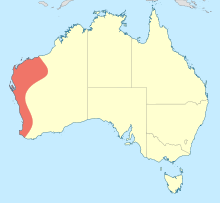Ictinogomphus dobsoni
Ictinogomphus dobsoni is a species of dragonfly in the family Lindeniidae which was formerly part of the family Gomphidae,[3][4] and known as the Pilbara tiger.[5] It is a medium to large, black dragonfly with yellow markings and clear wings.[6] Ictinogomphus dobsoni is endemic to the Pilbara region in Western Australia,[5] where it inhabits rivers, lakes and ponds.[7]
| Pilbara tiger | |
|---|---|
| Scientific classification | |
| Kingdom: | Animalia |
| Phylum: | Arthropoda |
| Class: | Insecta |
| Order: | Odonata |
| Infraorder: | Anisoptera |
| Family: | Lindeniidae |
| Genus: | Ictinogomphus |
| Species: | I. dobsoni |
| Binomial name | |
| Ictinogomphus dobsoni | |
 | |
Ictinogomphus dobsoni appears similar to Ictinogomphus australis.[5]
Gallery
.jpg) Female wings
Female wings.jpg) Male wings
Male wings
gollark: So am I. I just don't.
gollark: Yes, semicolons are not good in combat.
gollark: I'm sure there are *some*.
gollark: Unrelated: slowly, my reactor efficiency goes up... soon, it shall reach a slightly higher percentage.
gollark: It simulates injuries to individual bodyparts.
See also
References
| Wikimedia Commons has media related to Ictinogomphus dobsoni. |
| Wikispecies has information related to Ictinogomphus dobsoni |
- Dow, R.A. (2017). "Ictinogomphus dobsoni". IUCN Red List of Threatened Species. IUCN. 2017: e.T14278410A59256758. doi:10.2305/IUCN.UK.2017-1.RLTS.T14278410A59256758.en.
- Watson, J.A.L. (1969). "Taxonomy, ecology, and zoogeography of dragonflies (Odonata) from the north-west of Western Australia". Australian Journal of Zoology. 17 (1): 65–112 [88]. doi:10.1071/ZO9690065.
- "Species Ictinogomphus dobsoni (Watson, 1969)". Australian Faunal Directory. Australian Biological Resources Study. 2012. Retrieved 22 March 2017.
- Schorr, Martin; Paulson, Dennis. "World Odonata List". Slater Museum of Natural History. University of Puget Sound. Retrieved 23 March 2017.
- Theischinger, Günther; Hawking, John (2006). The Complete Field Guide to Dragonflies of Australia. Collingwood, Victoria, Australia: CSIRO Publishing. p. 162. ISBN 978-0-64309-073-6.
- Watson, J.A.L.; Theischinger, G.; Abbey, H.M. (1991). The Australian Dragonflies: A Guide to the Identification, Distributions and Habitats of Australian Odonata. Melbourne: CSIRO. ISBN 0643051368.
- Theischinger, Gunther; Endersby, Ian (2009). Identification Guide to the Australian Odonata (PDF). Department of Environment, Climate Change and Water NSW. p. 238. ISBN 978-1-74232-475-3.
This article is issued from Wikipedia. The text is licensed under Creative Commons - Attribution - Sharealike. Additional terms may apply for the media files.
